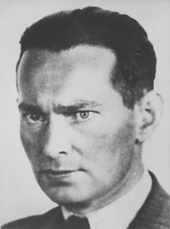Landelijke Knokploegen
Landelijke Knokploegen (LKP) ( German for "National Combat Groups" ) was the name for a Dutch resistance organization during the time of the German occupation of the Netherlands in World War II .
history

The LKP ( German literally also "Nationale Schlägertrupps " and abbreviated as LO / LKP ) was founded in August 1943 as an underground organization by the Landelijke Organizatie voor Hulp aan Onderduikers (LO) ( German about "National Organization for Help for People in Hiding" ), to help people who had to hide from the German occupiers. In order to survive, they had to rely on help, such as identification documents with false names and, above all, food stamps . These came not infrequently from attacks on local offices such as municipal administrations and in particular distributie cantors (allocation offices ) or from manipulation of the Dutch officials working there. In addition, LKP troops also carried out sabotage and occasionally assassinations of individual soldiers of the Wehrmacht and collaborators .
Spread over many small cells, the LKP comprised around 750 fighters in 1944. On September 5, 1944, they were officially amalgamated with the other two important armed resistance groups of the occupied Netherlands to form the Binnenlandse Strijdkrachten ( German for "Dutch Inlands - Armed Forces " ) by royal decree . These were the Ordedienst (OD) ( German "Ordnungsdienst" ) and the Raad van Verzet (RVV) ( German "Resistance Council" ), which until then had fought largely independently of one another against the German occupiers.
literature
- Rogier van Aerde: De Landelijke Knokploegen. PDF; 1 MB
- Coen van Tricht: Onderduikers en knokploegen. Verlag De Bataafsche Leeuw, Amsterdam 1991, ISBN 9067072605
Web links
- Name register aliases and real names of the resistance fighters (Dutch)
- Stichting Herinnering LO-LKP Memorial Foundation LO-LKP (Dutch)
- Film poster for the film “LO-LKP” from 1946. “A worthy contribution to the historiography of the Dutch resistance movement. The story of our homeland in slavery! LO- LKP National Organization National Knockploegen. "
- LO and LKP in the Resistance Museum Amsterdam (Dutch)
- Johannes ter Horst (1913–1944), Dutch resistance fighter (Dutch)
Individual evidence
- ↑ The Landelijke Knokploegen 1943–44 (Dutch), accessed on March 20, 2019.
- ^ LO and LKP in the Resistance Museum Amsterdam (Dutch), accessed on March 20, 2019.